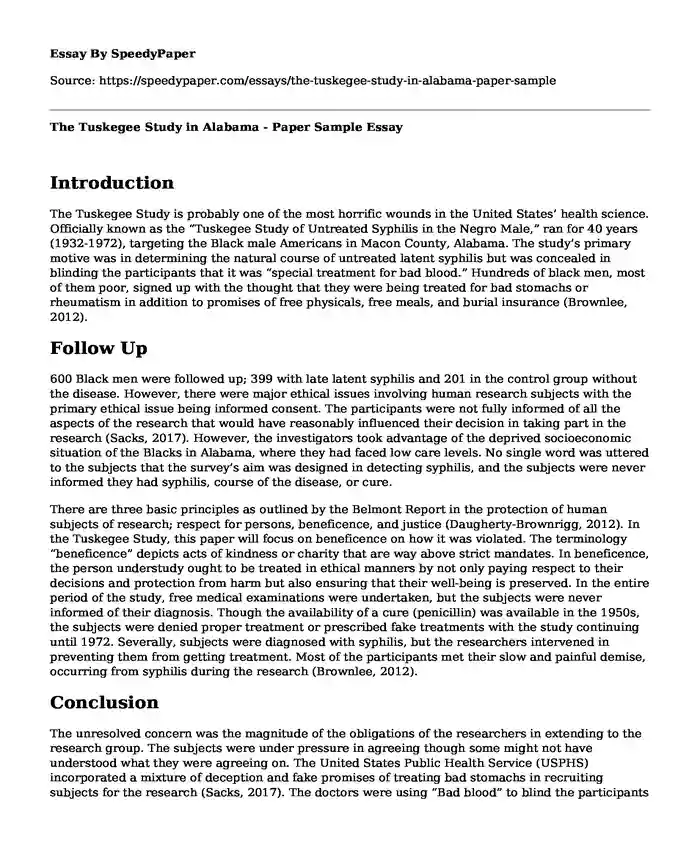
| Type of paper: | Essay |
| Categories: | United States Community health Black lives matter |
| Pages: | 3 |
| Wordcount: | 627 words |
Introduction
The Tuskegee Study is probably one of the most horrific wounds in the United States’ health science. Officially known as the “Tuskegee Study of Untreated Syphilis in the Negro Male,” ran for 40 years (1932-1972), targeting the Black male Americans in Macon County, Alabama. The study’s primary motive was in determining the natural course of untreated latent syphilis but was concealed in blinding the participants that it was “special treatment for bad blood.” Hundreds of black men, most of them poor, signed up with the thought that they were being treated for bad stomachs or rheumatism in addition to promises of free physicals, free meals, and burial insurance (Brownlee, 2012).
Follow Up
600 Black men were followed up; 399 with late latent syphilis and 201 in the control group without the disease. However, there were major ethical issues involving human research subjects with the primary ethical issue being informed consent. The participants were not fully informed of all the aspects of the research that would have reasonably influenced their decision in taking part in the research (Sacks, 2017). However, the investigators took advantage of the deprived socioeconomic situation of the Blacks in Alabama, where they had faced low care levels. No single word was uttered to the subjects that the survey’s aim was designed in detecting syphilis, and the subjects were never informed they had syphilis, course of the disease, or cure.
There are three basic principles as outlined by the Belmont Report in the protection of human subjects of research; respect for persons, beneficence, and justice (Daugherty-Brownrigg, 2012). In the Tuskegee Study, this paper will focus on beneficence on how it was violated. The terminology “beneficence” depicts acts of kindness or charity that are way above strict mandates. In beneficence, the person understudy ought to be treated in ethical manners by not only paying respect to their decisions and protection from harm but also ensuring that their well-being is preserved. In the entire period of the study, free medical examinations were undertaken, but the subjects were never informed of their diagnosis. Though the availability of a cure (penicillin) was available in the 1950s, the subjects were denied proper treatment or prescribed fake treatments with the study continuing until 1972. Severally, subjects were diagnosed with syphilis, but the researchers intervened in preventing them from getting treatment. Most of the participants met their slow and painful demise, occurring from syphilis during the research (Brownlee, 2012).
Conclusion
The unresolved concern was the magnitude of the obligations of the researchers in extending to the research group. The subjects were under pressure in agreeing though some might not have understood what they were agreeing on. The United States Public Health Service (USPHS) incorporated a mixture of deception and fake promises of treating bad stomachs in recruiting subjects for the research (Sacks, 2017). The doctors were using “Bad blood” to blind the participants in joining the study even though the term was a local colloquialism for a range of diseases; leukaemia and anaemia. The offered treatment incorporated of spinal taps that were being articulated as “spinal shots.” The subjects had rights whatsoever to be informed of the real intention of the study, but were blinded with fake details of the survey and worse of it all when penicillin was discovered as a treatment; they were intentionally denied the cure.
References
Brownlee, R. A. (2012). John C. Robinson: Father of the Tuskegee Airmen, and: The Tuskegee Airmen: An Illustrated History: 1939–1949 (review). Alabama Review, 65(4), 316–319.
https://doi.org/10.1353/ala.2012.0041
Daugherty-Brownrigg, B. (2012). Tuskegee Syphilis Study. Mental Health Practitioner's Guide to HIV/AIDS, 423–426. https://doi.org/10.1007/978-1-4614-5283-6_90
Sacks, T. K. (2017). The Single Case Study: Understanding the Life History of a Tuskegee Syphilis Study Descendant. doi:10.4135/9781473997189
Cite this page
The Tuskegee Study in Alabama - Paper Sample. (2023, Nov 07). Retrieved from https://speedypaper.com/essays/the-tuskegee-study-in-alabama-paper-sample
Request Removal
If you are the original author of this essay and no longer wish to have it published on the SpeedyPaper website, please click below to request its removal:
- Free Essay on Elbow Pain Case Study - Diagnosis and Treatment
- The Molarity of Abortion by Mark T. Brown, Free Essay
- Health Promotion Essay Example: Healthy Aging
- Health Care Funding in the US, Essay Sample at No Charge
- The Role of Registered Nurses in Healthcare Delivery in New Zealand - Paper Example
- Paper Example on Diagnosing HEENT Disorders
- Essay Sample on The Relationship Between Industrialization and the Spread of Disease
Popular categories




